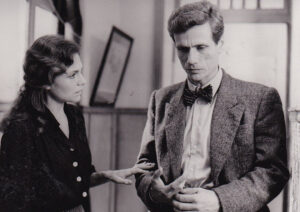Movie Info
Movie Info
- Run Time
- 1 hour and 55 minutes
- Rating
- PG
VP Content Ratings
- Violence
- 1/10
- Language
- 1/10
- Sex & Nudity
- 2/10
- Star Rating
Relevant Quotes
Again I saw all the oppressions that are practiced under the sun. Look, the tears of the oppressed—with no one to comfort them! On the side of their oppressors there was power—with no one to comfort them.
Learn to do good; seek justice, rescue the oppressed, defend the orphan, plead for the widow.

This 36-year-old TV film, directed by Anthony Page and written by Leonard Gross, is another worthy film to add to the small number that pay tribute to the all too few Germans who opposed Adolph Hitler. Like Alone in Berlin, reviewed in the May issue, this is set in Berlin. It is based on the non-fiction book by Leonard Gross The Last Jews in Berlin and stars the great French actress Jacqueline Bisset as the real life Countess Maria von Maltzan. It is thus, as with Alone in Berlin, not a Holocaust film filled with scenes of brutal atrocities, but a love story about a woman who said “No.” The title stems from the infamous Nazi Nuremberg laws that said all close contact between Jews and Aryans is forbidden, laws echoed in America dominated by Jim Crow.
The story begins with Nina, a student of veterinarian science, angry over Hitler’s invasion of Poland. Later she becomes upset when Nazis are harassing a grocer for selling to Jews. She is joined in fending off the bullies by a man whom she will meet later at a party and fall in love with, Fritz Friedlaender (Jürgen Prochnow). He is a Jewish writer whose mother Ruth Friedlaender (Irene Worth) refuses to leave the city. Like many other Jews she believes she is more German than Jew and cannot fathom that she might be in danger. When they meet, she is not pleased that her son is dating a Gentile, but as Maria continues to visit her, the two become close.
In the meantime, Maria, following on a friend’s tip, visits Swedish pastor Nils Arvidsson (Robert Dietl) who is part of an underground group smuggling Jews out of Germany. At first, she carries messages but, desiring to become more involved, helps transport Jews and even hide them herself. Fritz is against her involvement out of fear for her safety when he finds out, but she insists on continuing. Learning that in some of the camps Jews are being gassed, she again tries to convince Ruth to flee. The woman refuses until it is too late. The Gestapo arrest her and she is shipped to Theresienstadt, a model camp set up to fool the International Red Cross and others that all the deported Jews are being treated well.
Maria takes Fritz into her own apartment where she has a hiding place in an old couch should the Gestapo break in to search the place. She also opens her love and arms to a little girl who is orphaned during one of the Allied bombing attacks that now occur daily. There is yet to come a close call with the Gestapo and the invasion of the Russian troops in the final days of the war, each incident one of anxiety and suspense.
From February 1943 on most of the 30,000 Jews in Berlin were rounded up by the Nazis and sent to the death camps. Thanks to her work with the Swedish Church 60 of them were smuggled to safety. Unlike the couple in Alone in Berlin, she survived the war, though she endured many setbacks, some with her husband Hans Hirschel (for some reason his name was changed to Fritz in the film), and some with her health, though she lived long enough to appreciate the “Righteous Among the Nations” award from Israel in 1987, dying in Berlin in 1997. This film is a moving tribute to a brave woman who dared to say “No” to false values of her world. What would she say today to our fear of immigrants, this woman who after the war took the side of immigrants in her own country? What would she call the camps into which we herd immigrant children who are separated from their parents?
Watch the film on YouTube by clicking here.
This review will be in the June issue of VP along with a set of questions for reflection and/or discussion. If you have found reviews on this site helpful, please consider purchasing a subscription or individual issue in The Store.

What would she say about economic immigrants getting government assistance, then vacationing in their former countries OR floods of illegal immigrants lowering wages of the working poor OR wealthy women coming to the U.S. to have anchor babies OR Islamic terrorist immigrants attacking and driving Jews out of France OR immigrant “no-go” zones in Europe run by ethnic drug gangs OR Islamic genital mutilation of girls OR murders of criticizers of Islam OR years of Pakistani group sex enslavement of poor British girls with officials paralyzed by fears of allegations of racism? Nazi holocaust is an apples and oranges comparison, completely unhinged from today’s realities.
You raise some extra issues, many of which I think our heroine would think are wrongs. However, you don’t address the issues I raised in the review, so am I to assume that you agree with the false charge that most Latin Americans are rapist and murderers; that it is okay to grab children from their parents and put them in cages; and that it is fine to let private groups make a profit running concentration camps? I think that raising the issues you do–and you must have worked hard to come up with such a list– muddies the waters. If your silence on the issues I listed means assent, then we have no common ground for further discussion.